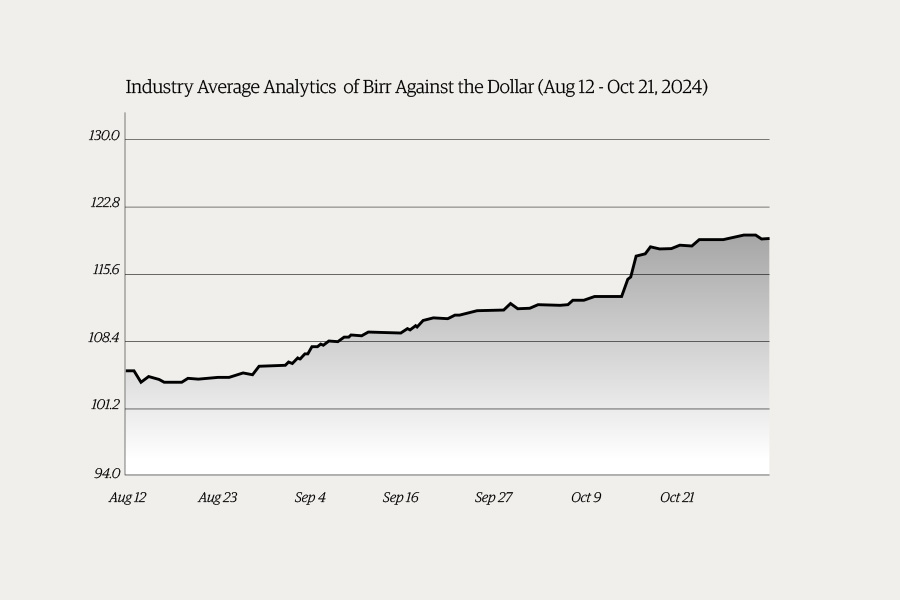
Money Market Watch | Nov 03,2024
Jul 7 , 2024
By MUNIR SHEMSU ( FORTUNE STAFF WRITER )
Banks are scrambling to comply with new credit exposure regulations as the National Bank of Ethiopia's (NBE) 90- day action plan submission deadline approaches. Among the five directives approved by the central bank in midJune, the prudential provisions governing large exposures to counterparts or groups of connected counterparties aim to mitigate credit concentration risks.
Banks must ensure that the total aggregate sum of their on-balance sheet items, including loans and advances, and off-balance sheet items, such as letters of guarantee or credit, to related parties does not exceed a quarter of their capital. This requirement excludes credit risks from lending to the federal or state governments and state-owned enterprises.
Central bank's inaugural financial stability report, released two months ago, revealed a high degree of credit concentration, with the top 10 borrowers in the banking industry holding nearly 23.5pc of the total 1.9 trillion Br in loans and advances.
Belete Fola, portfolio manager & principal examiner, said the directives were informed by consultations with international partners like the International Monetary Fund (IMF) and the World Bank to reflect international best practices. He noted that banks are likely to submit their plans in the final quarter of the three-month deadline due to the operational implications for future lending practices.
“They need to conduct deep assessments of their overall exposure,” Belete told Fortune.
He said each bank's unique credit portfolio and lending history should inform how they plan to meet the threeyear compliance deadline.
"Some will need a short time while a few could struggle," he said.
The financial stability report also revealed that a mere 0.5pc of borrowers with a credit exposure above 10 million Br held nearly three-quarters of the banking sector's loans.
Abiy Berhane, director of the credit analysis & appraisal department at Berhan Bank, said they have formed teams to determine what adherence to the directive looks like in the long run. He noted the complexity of establishing the exact nature of the relationship between counterparties amid the overall challenges of customer information nationally.
“This is something that all banks will struggle with,” Abiy told Fortune. Abiy said a thorough understanding of the directives' implications is needed before developing an action plan. He referred to the potential relationship between people with major influence at a bank and how it could affect credit exposure risks from related parties.
“NBE could assist with information disclosure,” Abiy said, “especially about people who have a say on boards.” Yehualshet Zewdu, deputy president of Wegagen Bank, expressed a similar sentiment, noting that the bank is preparing an explanation letter to send to the central bank for a comprehensive understanding.
“We would not want to be in violation unknowingly,” Yehualashet told Fortune.
These concerns are common to many banks. The Ethiopian Bankers Association is preparing a meeting with several commercial bank executives to discuss the implications of the changes. Demsew Kassa, secretary general of the Association, said issues related to the timeline for full compliance with the directives and pending reforms to the banking law will be on the agenda.
“Coming to a common understanding on the readings is the main goal,” he said. While the Association had been consulted on the five directives and the draft banking law, amendments to the number of years it takes for full compliance with the requirements have created some trepidation.
A director of risk and compliance at one of the largest commercial banks said a lengthy assessment will be needed to develop an action plan. The executive noted the need to introduce information and technology systems to meet the central bank’s requirements.
“Identifying related borrowers will be particularly difficult,” he said.
According to the director, banks that have relied on sheer collateral size without a thorough dive into ownership structures in related companies would need to reexamine their books.
“Foresight will matter more than haste when coming up with the action plan,” he said.
Veteran banker and researcher Eshetu Fantaye said prudential provisions related to credit exposure have constantly changed since the banking sector was liberalised in 1995. He underscores that credit exposure risks pose the highest level of danger, potentially leading banks to insolvency or bankruptcy if not adequately addressed.
“Regulators probably saw something they didn't like within the sector,” Eshetu told Fortune.
He recalled elements of the stability report that signalled high levels of related party transactions, which can threaten the integrity of the banking industry. He pointed to provisions in the draft banking law that allow the central bank to shut down a bank's operations for up to five days if it is at risk.
“Poorly managing exposure is indicative of bad corporate governance,” Eshetu said.
He noted that the central bank's approach has increasingly shifted towards international best practices over the past year while raising concerns about the exemptions extended to SOEs. While the central bank's stress report indicated the overall financial soundness of the banking sector, it highlighted the importance of closely monitoring the Commercial Bank of Ethiopia's exposure to loans transferred to the Liability & Asset Management Corporation from SOEs.
PUBLISHED ON
Jul 07,2024 [ VOL
25 , NO
1262]

Money Market Watch | Nov 03,2024

Fortune News | Apr 30,2022

Radar | Jun 12,2021

In-Picture | Aug 04,2024

Fortune News | Nov 24,2024

Dec 22 , 2024 . By TIZITA SHEWAFERAW
Charged with transforming colossal state-owned enterprises into modern and competitiv...

Aug 18 , 2024 . By AKSAH ITALO
Although predictable Yonas Zerihun's job in the ride-hailing service is not immune to...

Jul 28 , 2024 . By TIZITA SHEWAFERAW
Unhabitual, perhaps too many, Samuel Gebreyohannes, 38, used to occasionally enjoy a couple of beers at breakfast. However, he recently swit...

Jul 13 , 2024 . By AKSAH ITALO
Investors who rely on tractors, trucks, and field vehicles for commuting, transporting commodities, and f...

Oct 18 , 2025
The political establishment, notably the ruling party and its top brass, has become p...

Oct 11 , 2025
Ladislas Farago, a roving Associated Press (AP) correspondent, arrived in Ethiopia in...

Oct 4 , 2025
Eyob Tekalegn (PhD) had been in the Governor's chair for only weeks when, on Septembe...

Sep 27 , 2025
Four years into an experiment with “shock therapy” in education, the national moo...